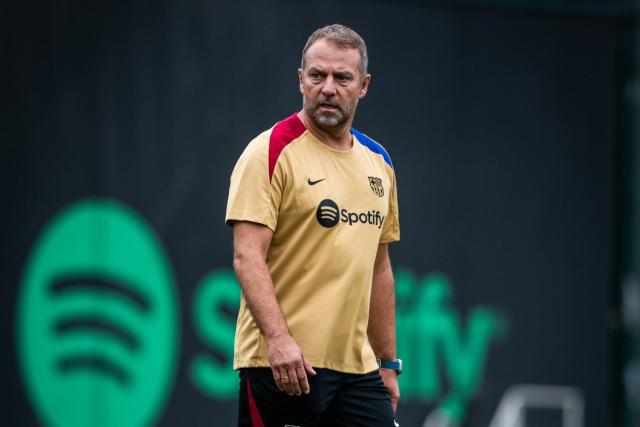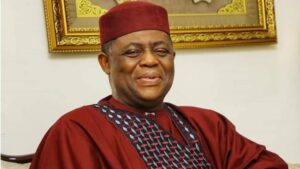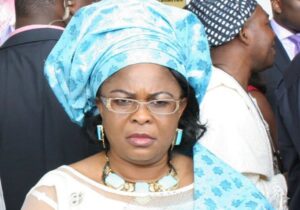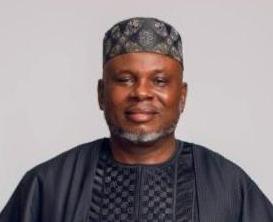First he went to the Costa Brava, visiting the small, picturesque towns of Llafranc and Calella de Palafrugell. Next he was in Sant Quirze del Vallès, taking the staff to Masia Can Ferran, a restaurant favoured by Pep Guardiola and Xavi Hernández where they have served traditional Catalan cuisine since 1949. Then he was back in Barcelona for the Diada, Catalonia’s national day which commemorates the fall of the city in 1714. And on Sunday Hansi Flick’s Catalan week will be complete when he travels to Girona, home of Carles Puigdemont, the Generalitat’s president in exile, for the derby.
“Flick is integrating into the country, the city and the club, and he it was who said he wanted to experience this day that’s so special in Catalonia,” Barcelona’s president, Joan Laporta, said after his coach joined the club delegation laying a floral offering at the statue of Rafael Casanova i Comes, the conseller en cap (mayor) injured during the siege 310 years ago. “A round of applause for Flick,” wrote one nationalist newspaper, “next step, speak Catalan in press conferences, but let’s not hurry him”. Applause? Ten days earlier, at the Lluís Companys Olympic stadium on Montjuïc hill, they had sung his name.
In short, Barcelona’s new coach has not put a foot wrong, Laporta describing him as a man who does not complain or seek excuses, the unlike Xavi going without saying. And while for now English will have to do – in the dressing room and the press room – that includes where it matters most. “It makes me feel proud that the fans chanted my name but it’s only the fourth game, things can change, and it’s about the team,” the 59-year-old said. Four games is early, especially to be singing a coach’s name, but the serenade did come during a 7-0 win over Valladolid.
Barcelona, it turns out, are … well, good. They go into the meeting with Girona, 99km north at Montilivi where they were defeated last season, top and four points ahead of Real Madrid, Atlético Madrid and Villarreal, with four wins from four. No one in Europe’s big five leagues has scored more. Three of those wins were 2-1, it is true – against Valencia, Athletic Club and Rayo Vallecano – and in two they conceded first, but it is a start; it is also at least a bit of a surprise.
Last week, Laporta held a press conference to address the club’s economic, institutional and sporting state; this week, the sporting director, Deco, did an in-house interview covering the summer’s work. The tone was optimistic – it is always optimistic – but issues remain. When Laporta claimed they had not reached “1:1” because they “hadn’t wanted to”, most laughed; 1:1 had been the stated target, that point of supposed financial normality at which a club is allowed to spend a euro for every euro they bring in. Barcelona are still €60m (£50.6m) off.
They had pursued Nico Williams but not been able to sign him. They searched for a centre-back or full-back, and they didn’t have a deep midfielder. Ilkay Gündogan returned to Manchester City, convinced his exit was about finance not football and saying he hoped his departure could “help”. Five of the six players who came last summer have gone and although two were on loan, they had said they hoped João Félix and João Cancelo might continue. The one who is there, Iñigo Martínez, was registered thanks to a rule allowing clubs to “use” 80% of an injured player’s salary, in this case Ronald Araújo, on someone else until December.
Deals were done on a dozen, mostly minor departures but it wasn’t enough and so the same rule was used to finally get their one major signing registered. Dani Olmo replaced Andreas Christensen on the books until December after the club convinced the league that the Dane’s injury was actually long term after all. Other absences are more significant: Gavi, Frenkie de Jong and Araújo are still a long way off returning.
Olmo, forced to sit out the first two games, came on at half-time in Vallecas and his impact was immediate. Against Valladolid four days later he was superb, scoring one, hitting the post twice and having another disallowed. Raphinha scored a hat-trick. “This has shown we don’t have to sign anyone else,” the Brazilian said, pointedly. “This game says a lot about what we’re doing.”
What they are doing has impressed. Some of it is only natural, and too early to declare definitive. Alejandro Balde is fit. So is Pedri, and he is enjoying playing with Olmo. Jules Koundé seems to have accepted the full-back role. Lamine Yamal is a year older and consolidated now at, erm, 17. And Robert Lewandowski, who is 19 years older, is something more like Lewandowski again. Yamal has a goal and four assists, more than anyone, and his level and consistency have been astounding; the Pole, pushed into the penalty area again, is top scorer.
His relationship with Xavi had been uneasy, a reason for appointing the former Bayern Munich coach in the first place. Asked about the new Lewandowski, Flick replied: “This is the Robert I know; I never knew another.”
But there is more. “Flick understood perfectly what our value is, our jewel: La Masia,” Laporta said, and in times of financial difficulty and limitations on signings even more so. There have been no demands, he came with his eyes open, aware of the reality of the club. Last week can be seen as another illustration of that, a willingness to engage, learn and understand his environment. He has told his players they must accept and not waste time on what they cannot change and work with what they have. Against Rayo, three 17-year-olds started.
Flick has given debuts to Gerard Martín, Sergi Domínguez and Marc Bernal, who impressed so much in the pivot position that the coach told the club there was no urgency to sign there, only for the 17-year-old to then sustain a cruciate tear in Vallecas. There has been a first start, and a second, for 20-year-old Marc Casadó, and there will be more. At the end of the Valladolid game, Flick went straight to Héctor Fort, the 18-year-old he had not put on the pitch; he is yet to get a minute but he will. At centre-back, Pau Cubarsí, 17, has been central to bringing the ball out, especially with his long passing.
The structure has changed – closer to 4-2-3-1 than 4-3-3, with Olmo in a No 10 role – and so has the application, the identity. And, especially, the intensity. Some of the habits have changed too, a strictness around the squad gently reapplied. On the touchline Flick is a more controlled, composed presence, but they are aware of what he wants. This is a more direct Barcelona, the defensive line higher, the ball moved forward quicker. Flick’s intention is to press higher – “more than is normal,” in his own words – and never let up. The sample size is too small still but the stats show all that and so does the eye test. Something, it feels, is taking shape, an intent emerging.
“Flick is a calm, hard-working person, a coach who’s clear about what he wants and is very demanding,” Deco says. Flick says: “When you have a clear idea, it gives you confidence: the players are in position and they know what to do with the ball.”
They are in better shape to do so, too. It is easy to doubt or even dismiss the inevitable claims that a team are working hard now – an often loaded line aimed at the last incumbent and said of every new coach, every time – but something is different. Flick was not the only arrival. He came with his own staff of course: Marcus Sorg, Toni Tapalovic, and Heiko Westermann. Thiago Alcântara worked with him briefly to aid the early steps. Yet Barcelona also restructured the physical work at the club, a decision announced before his arrival. Julio Tous, who worked with Antonio Conte, is the head of a new four-man team of fitness coaches. There is a new head of physiotherapy too.
Flick publicly thanked Deco for “the big experts he has brought in”, saying: “The players know that they are well trained and that they can play at a high level for 90 minutes.” The sporting director said: “I’m not an expert on fitness, we just try to bring in the best people: it was something we could improve.”
During the international break Pedri admitted: “We’re working much harder than before. I think the fitness coaches they have brought in have been very good for us. We’re working hard and you can feel that in games. The team doesn’t drop after minute 70 or 80, but instead keeps its physical level.”
And so here they are, top of the table and hoping to stay there after another seven days in which the coach has quietly got on with getting everything right, his Catalan week concluding with the derby, life better at Barcelona. “I feel liberated,” Pedri said. “Flick has told me to play without pressure. He’s very good with us, close to us, giving us confidence. Of course when you have to take things seriously he does. He has that touch of a sergeant major but he’s lovely really.”










More Stories
Amorim insists Fernandes not leaving Manchester United amid Madrid reports
How debt burden pushed Nigerian boxer Segun Olanrewaju to a fight that took his life
Nigeria Taekwondo Federation boss, Abdullahi Saidu dies at 53